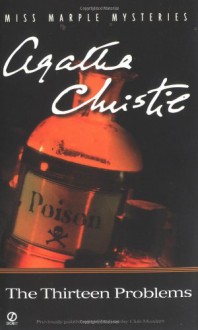
I (re)read this book for two reasons: I belong to a group reading Agatha Christie's oeuvre in order of publication, and it fit a Halloween Bingo prompt - 13. Either one of those reasons would have been a good enough excuse to read this charming little collection of Miss Marple showing everyone up.
13 short stories: the first 6 of which share a common tie of being stories told at the Tuesday Night Club, an impromptu gathering where each person tells the tale of a mystery that went unsolved at the time. The next 6 stories are tied together in a similar way, as stories all told around the dining table one evening. The last story is a 'stand-alone' although it relies on the friendship established in the previous stories between Miss Marple and Sir Henry Clithering.
Without exception, each story is excellent. Some are more excellent than others; in my opinion, The Blue Geranium is the absolute stand-out, though Motive vs Opportunity comes close. The weakest was probably the last, for me, Death by Drowning. It's solid, but in comparison, duller than the previous 12 stories.
I have a confession to make about Agatha Christie's books: I dislike both Miss Marple and Hercule Poirot. I find that in the longer books Miss Marple tends to natter on a bit too much and plays the "old spinster" and "aww shucks" hands a little too strongly. Hercule Poirot is just ... an amalgamation of the worst traits of Holmes and Dupin is as close I can come to a description. I don't find him as comical as most.
However, these short stories offer the perfect dose of Miss Marple: for almost all the stories, her participation is relegated to the end, so the simpering is contained. I also really tried, while reading these, to re-imagine Miss Marple in my mind by remembering the subjectivity of the descriptor 'old' and the stereotype of 'spinster'. Yes, Miss Marple has white hair and knits, but I know many a 50-60 year old that has white hair and knits. I don't recall her age ever being mentioned in the books I've read so far, so perhaps I dislike Miss Marple because of popular portrayals, combined with current attitudes about the adjectives that Christie used 100 years ago, when they covered broader spectrums.
I was partially successful; it was a struggle. Ingrained conceptions die hard. Fortunately I have a lot of books ahead of me to use for mental re-programming. Now if only I could figure out a way to like Poirot...

 Log in with Facebook
Log in with Facebook 










